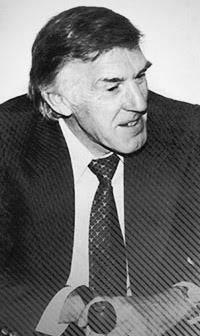Robert Holmes

(this image appears for illustrative purposes only and no attempt is made to supersede any copyright attributed to it)
Robert Colin Holmes
Born: Friday 2nd April 1926Died: Saturday 24th May 1986 (age: 60)
Robert Holmes was an English television scriptwriter, who for over twenty-five years contributed to some of the most popular programmes screened in the UK and is considered one of the best writers to have worked on Doctor Who.
In 1944, at the age of eighteen, Holmes joined the army, fighting with the Queen's Own Cameron Highlanders regiment in Burma. He became the youngest commissioned officer in the entire British army during the Second World War. After the end of the war, Holmes returned to England and left the army, deciding to join the police. He trained at Hendon Police College, graduating the top of his year and joining the Metropolitan Police in London, serving at Bow Street Police Station. While serving at a Police officer that Holmes developed an interest in writing as a career. He worked for a time writing and editing short stories for magazines, before receiving his first break in television when he contributed an episode to the famous medical series Emergency Ward 10 (1957).
Holmes found himself working almost exclusively in television drama after 1957. He began contributing episodes regularly to the adventure series Knight Errant before becoming that programme's Story Editor in 1959. He wrote several episodes of another medical drama, Dr. Finlay's Casebook, before in the early 1960s writing for a range of crime-related dramas: Dixon of Dock Green, The Saint, Ghost Squad, Public Eye. Iin 1965 that he first began writing in the science-fiction genre, when he contributed scripts to Undermind, a body-snatching drama fromITV. He also worked in film for the only time, storylining the movie Invasion, which had also been inspired by Nigel Kneale's 1955 Quatermass II serial.
During the late sixties and seventies and early eighties Holmes has penned some of the most highly regarded stories for Doctor Who, including writing the story voted by the fans as the best ever, The Caves of Androzani. In 1970 he created the Autons for the introduction story for Jon Pertwee and in 1974 created The Sontarans. He wrote the first story featuring The Master .
Holmes served as as script editor three years, seeing Doctor Who through one of its most successful eras in terms of both viewing figures and critical acclaim. Despite this, a number of stories came under fire for being excessively violent or too frightening in tone by Mary Whitehouse and her National Viewers' and Listeners' Association. A scene from Holmes's story, The Deadly Assassin, caused controversy when the Fourth Doctor's head is held under water as the cliffhanger,
During a break from the series he wrote for the BBC science-fiction show Blake's 7, the police series Juliet Bravo and an adaptation of the science-fiction novel Child of the Vodyoni, which was screened as The Nightmare Man in 1981. He also script-edited detective series Shoestring (TV series).
His final story for Doctor Who was the first four-part segment of Trial of a Time Lord Season. He has began writing the final segment of the season, but died before completion
His last work to be broadcast was an episode of the detective series Bergerac.
Russell T Davies praised Holmes' talents, saying "Take The Talons of Weng Chiang, for example. Watch episode one. It's the best dialogue ever written. It's up there with Dennis Potter. By a man called Robert Holmes. When the history of television drama comes to be written, Robert Holmes won't be remembered at all because he only wrote genre stuff. And that, I reckon, is a real tragedy." Davies has also mentioned that Holmes' story The Ark in Space is his favourite story from the original series.





 Home Region:
Home Region:
